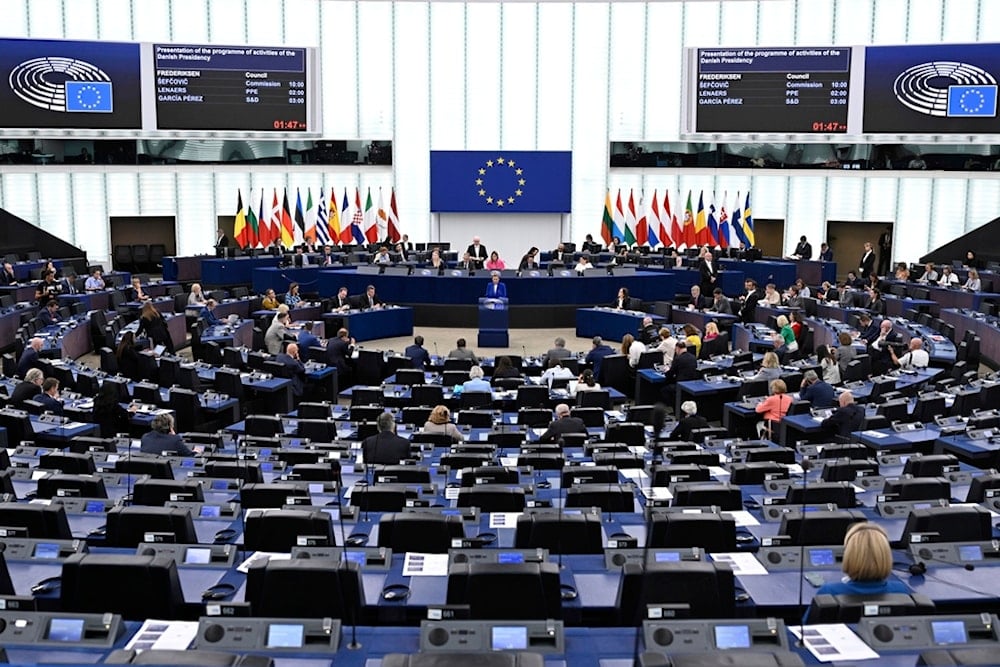EU strikes so-called aid deal with 'Israel' amid calls for sanctions
The European Union has reached a humanitarian aid deal with "Israel" to increase Gaza relief deliveries, but the agreement comes amid growing internal rifts, with several member states pushing for sanctions after a leaked review found "Israel" violated the EU's human rights commitments under Article 2 of their Association Agreement.
-

The European Parliament in Strasbourg, eastern France. (AP Photo/Pascal Bastien)
The European Union on Thursday reached a deal with "Israel" to allegedly allow more humanitarian aid into Gaza, as calls intensify within the bloc to hold "Israel" accountable for its repeated violations of international law and war crimes.
EU foreign policy chief Kaja Kallas claimed that the agreement includes a "substantial increase of daily trucks for food and non-food items to enter Gaza," the reopening of aid corridors via Jordan and Egypt, and the activation of additional crossings in the north and south of the besieged territory. Bakeries and public kitchens will resume food distribution, while fuel deliveries to humanitarian facilities are set to restart.
"These measures are or will be implemented in the coming days, with the common understanding that aid at scale must be delivered directly to the population and that measures will continue to be taken to ensure that there is no aid diversion to Hamas," Kallas said.
A European Commission spokesperson told Bloomberg that "this deal results as the outcome of the dialogue that [Kallas] has launched with the foreign minister of Israel, Gideon Saar."
Mounting Repercussions
The aid deal comes amid deepening divisions within the EU over its approach to "Israel." A leaked internal review by the European External Action Service (EEAS) concluded that there are "indications of a breach" of the EU–Israel Association Agreement, particularly its human rights clause, Article 2.
In response, the EU is preparing an "options paper" outlining a range of punitive measures, from partial suspension of the agreement to visa bans, arms embargoes, and restrictions on trade with illegal Israeli settlements. These proposals will be debated at the upcoming Foreign Affairs Council on Tuesday. According to diplomats, the paper also considers targeting specific individuals and entities involved in rights violations, including extremist settlers and military figures.
Behind the scenes, an EU technical delegation led by Middle East envoy Christophe Bigot recently traveled to occupied Palestine to finalize humanitarian arrangements. However, critics argue that logistical coordination cannot substitute for meaningful accountability.
Read more: Macron calls on UK to recognize Palestine during State visit
Fractured Consensus
Countries such as Spain, Ireland, and Belgium are leading calls for tougher action. Spain has already canceled arms exports to "Israel" and is pushing for an EU-wide weapons embargo. Ireland and Belgium have endorsed suspending the Association Agreement altogether. Meanwhile, France's foreign minister Jean-Noël Barrot declared that "Israel clearly violated" Article 2, adding that consequences must be drawn in the next round of EU meetings.
Nine EU countries have also jointly called for a formal proposal to end all trade and investment with Israeli settlements, citing the July 2024 advisory opinion by the International Court of Justice affirming their illegality.
Former EU foreign policy chief Josep Borrell issued a pointed warning that Europe’s credibility is at stake. Yet despite growing support, resistance from Germany, Hungary, and Austria continues to block consensus on broader sanctions.

 3 Min Read
3 Min Read








